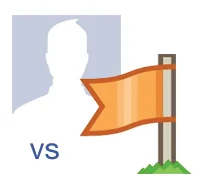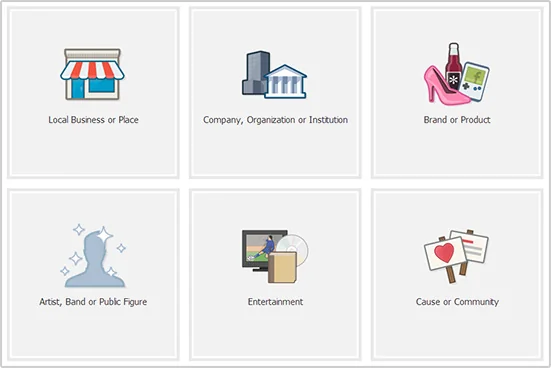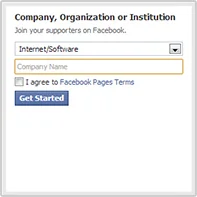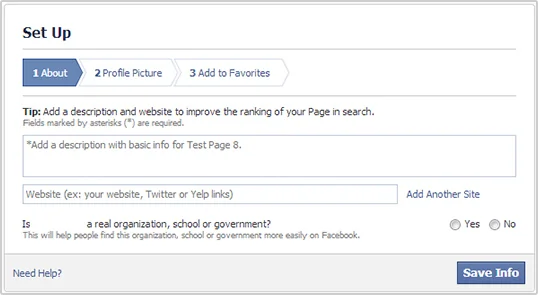How to create a Facebook page for your business
Lesson 2 of 7 of our small business guide to Facebook
Getting started with your Facebook page
Before we start, you will need a regular Facebook profile account. If you haven’t got one yet, just visit facebook.com and sign up. Once you have set up your personal Facebook account profile, you can then create a new Facebook ‘page’.
First, though, let’s explain the differences between a Facebook profile and a Facebook page.
Differences between a ‘Profile’ and a ‘Page’
It’s easy to get confused between these two types of accounts on Facebook. A ‘profile’ account is a regular, personal account for Facebook users. Everyone on Facebook has a profile, and you can use yours to ad d and request new friends, leave comments, upload photos, etc.
A Facebook ‘page’ is different. A page doesn’t represent an everyday individual, but is intended specifically for a business, organisation or personality. You don’t add a Page as a Facebook friend, but you can instead become a fan of a page associated with a brand.
Facebook is very keen to see businesses using pages, not personal profiles: so much so that they have been known to shut down personal profiles that were set up specifically to promote a business.
This would be a disaster after all the hard work you have put into your page, so it’s important to just create a Facebook page from the start.
The differences between a Facebook profile and a page If you are reading this and already use a personal profile for your business, it is possible to convert your profile to a page simply by using the ‘Profile to Business Page Migration’ service here.
This will migrate your profile photo and friends list only, so make sure you have backed up any other data on your page, such as descriptions and other content.

The benefits of having a ‘page’ for your business vs. a regular ‘profile’ account:
The safe way to get your business on Facebook
Facebook insists that businesses use a proper business page. If you use a personal profile, you may get your account shut down without warning!
Access to Facebook Ads
When you use a Facebook page, you can also take advantage of the Facebook advertisement platform to reach potential customers.
Personal profiles are limited to 5,000 ‘friends’
Personal profiles are limited to the amount of friends you can connect with, so if you use one for your business, your maximum audience stops at 5,000. The largest brands using Facebook pages attract millions of fans.
Page tabs
A Facebook ‘tab’ is a separate page that can display a variety of different things from your Facebook fan page. One example of a tab would be a customised app that requests user information, such as an e-mail address, to help you build up a newsletter subscription list for your business.
Facebook Insights
If you use a page instead of a profile, you get access to Facebook Insights, a system that allows you to collect and download a huge amount of data about your customers. This is a massive plus once your page starts growing, and can help your business target potential new customers.
It just looks more professional
Facebook users might get confused if they land on a personal profile when they expect to see a Facebook page. First impressions count!
Creating a business page
You can create a page from your profile feed using the left-hand-side column under the ‘pages’ link.
However, the quickest place to start is here: https://www.facebook.com/pages/create.
On the ‘create’ page, you will see six options for your new page.

Local Business or Place
A physical place of retail business: usually a shop, restaurant or local business trade.
Company, Organisation or Institution
This option is for businesses that do not have a physical location for customers to visit, or for larger companies with multiple locations. Organisations and institutions also fall into this category, such as schools, universities, political parties and societies.
Brand or Product
If your products are sold through more than one website or stocked by more than one retailer, select the ‘Brand or Product’ page type.
Artist, Band or Public Figure
This option is the most similar to a personal profile. It’s for an individual who is in the public eye, and is suitable for the budding DJ, photographer, singer, artist and everyone in between.
Entertainment
Launching a magazine, TV show or movie? This is the option to promote entertainment ventures.
Cause or Community
This option is for non-profit causes such as charities and local community groups.

It’s likely your business will fall into one of the first four options, so once you’ve decided, just tick the box to agree to Facebook Pages Terms and enter your details to proceed.
From here, you need to fill in the relevant information to set up your page. In the description field, add a sentence about your business, with important keyword terms at the beginning of your description.
The description is very important, as this will be one of the big factors determining where your page will rank when people search specific terms using Facebook’s search. You’ll also have an option to add some relevant links to your page, such as your company website and Twitter address. Save your info and move on.
After you choose a profile image for your page, you will be able to submit all of the information you have added about your business.
Your Facebook page is now live! Now you can start to customise and optimise your Facebook business page.
